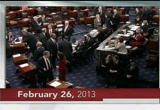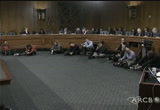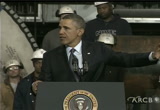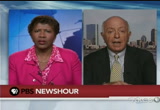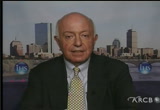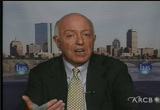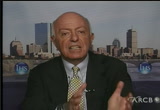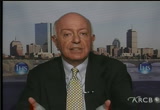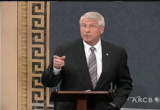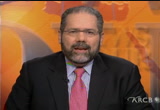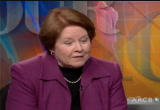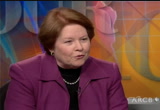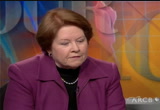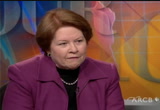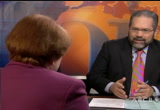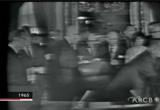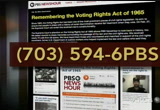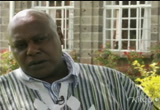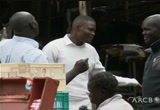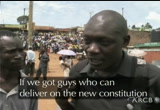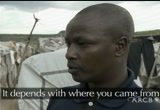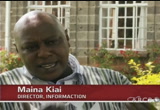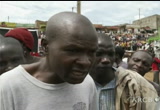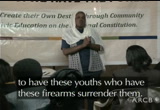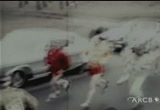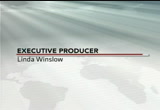tv PBS News Hour PBS February 26, 2013 5:30pm-6:30pm PST
5:30 pm
5:32 pm
captioning sponsored by macneil/lehrer productions >> ifill: federal reserve chairman ben bernanke warned lawmakers today that the automatic spending cuts set to take effect friday will hurt the economic recovery. good evening. i'm gwen ifill. >> woodruff: and i'm judy woodruff. on the newshour tonight, we examine the battle over those cuts, and how the paralysis in washington could affect hiring, investment, and more. >> ifill: then, we get the latest on the senate vote to confirm former senator chuck hagel as the next secretary of defense. >> woodruff: ray suarez talks with marcia coyle about today's supreme court arguments over
5:33 pm
getting a d.n.a. sample from a suspect who was arrested but not convicted of a crime. >> ifill: special correspondent kira kay previews next week's presidential contest in kenya, where memories linger from the violence that followed the 2007 elections. >> we talk about people dead. i think if you count it over time and those who don't know it's probably around 2,000. massive, huge kills. we were on the brink of civil war. >> woodruff: and we close with a conversation with gloria steinem about the women's movement and the pbs documentary, "makers: women who make america." >> we have realized that a majority of americans fully agree that women can do what men can do but we haven't yet realized that men can do what women do. >> ifill: that's all ahead on tonight's newshour. >> major funding for the pbs newshour has been provided by:
5:34 pm
moving our economy for 160 years. bnsf, the engine that connects us. >> and by the bill and melinda gates foundation. dedicated to the idea that all people deserve the chance to live a healthy, productive life. >> and with the ongoing support of these institutions and foundations. and... >> this program was made possible by the corporation for public broadcasting. and by contributions to your pbs station from viewers like you. thank you.
5:35 pm
>> ifill: the federal government moved another day closer today to $85 billion in automatic spending cuts. and as political charges and counter-charges flew, federal reserve chief ben bernanke raised new fears about the potential economic fallout. the fed chairman told a senate committee that forcing across-the-board spending cuts could slice half a percentage point off economic growth. >> i think an appropriate balance would be to introduce these cuts more gradually and to compensate with larger and more sustained cuts in the longer run to address our longun fiscal issues. >> ifill: bernanke said the sequester was supposed to be a doomsday weapon designed to spur compromise. >> it was done to be sort of like dr. strangelove, you know, the bomb that goes off.
5:36 pm
so obviously if you can find a way to, you know, in a bipartisan way to make it more effective and better prioritized, that would be a good thing. >> ifill: instead the spending cuts could begin to take effect at week's end. president obama, speaking at a shipyard in new port news, virginia, delivered fresh warnings today that the spending cuts would result in painful, self-inflicted wounds. >> because of these automatic cuts, about 90,000 virginians who work for the department of defense would be forced to take unpaid leave from their jobs. so that's money out of their pockets. money out of their paychecks. and then that means there's going to be a ripple effect on thousands of other jobs and businesses and services throughout the commonwealth. >> ifill: the president pressed for a compromise that combines targeted spending cuts with increased tax revenue. >> there are too many
5:37 pm
republicans in congress right now who refuse to compromise even an inch when it comes to closing tax loopholes and special interest tax breaks. and that's what's holding things up right now. >> ifill: the administration announced today another response to the impending cuts. the release of hundreds of detainees held at immigration detention centers. republicans called it a ploy. nd bk at the capitol, house speaker john boehner said mr. obama cannot be trusted. >> the american people know the president gets more money, they're just going to spend it. the fact is that he's gotten his tax hikesment it's time to focus on the real problem here in washington and that is spending. >> ifill: boehner complained that the president is busy holding campaign rallies while senate democrats do nothing. in the last congress the republican-controlled house passed two alternatives. >> we should not have to move a third bill before the senate gets off their ass and begins to do something.
5:38 pm
>> ifill: senate majority leader harry reid shot back. >> i think he should understand who is sitting on their pose tear i don't remember. we're doing our here to pass something. and the reason he's not bringing up something over there is because he can't pass it. he can't get his caucus to agree on anything. >> ifill: but republican senator roy blunt of missouri said democrats have to face facts. >> the spending cuts are going to happen. and the option now for the president is, do you want to rk for a different way for these same savings to be achieved? and that's very do-able. >> ifill: friday is not the last deadline. another one looms in late march when government funding runs out. for more on whether political paralysis in washington is spilling over onto the economy, we turn to nariman behravesh, chief economist for i.h.s., a research and forecasting firm. we have heard in the last couple
5:39 pm
of days, weeks, surveys, polls that show that a lot of americans to the exten theye following this story do think there's a problem here with this so-called sequester but they don't necessarily think it's going to affect them. are they right some. >> well, i think it will affect some americans but it's not going to have a broad impact. it will affect certain industries, for example, those that are suppliers to the defense industry. it might affect the airlines if there are air traffic control delays. it will not have a broad-based effect. it will be very targeted at least the way it's currently being proposed on some key industries, defense in particular. >> ifill: when ben bernanke says it will... it will apply a half percentage point drag on the economy, measure what that means for us. what does that mean? >> i think the good news here is that the u.s. economy is actually growing at probably about a 2% rate. so if the full sequester goes in and stays in place for the full
5:40 pm
year between now and the end of the year, then it's essentially what mr. bernanke is saying growth will be 1.5% instead of 2%. i doubt very much that's the way it's going to pan ot. entllysome kind of compromise will be worked out. but again the good news is that the u.s. consumers, u.s. businesses, are beginning to spend, are beginning to hire in the case of businesses, and that momentum seems to actually be picking up a little bit. so even in the worst case scenario we're not talking a recession. we're talking slower growth which isn't good... >> ifill: not good at a time when you're recovering. so when people look at this debate that's going on now, how do we look at it? do we look at it long-term, short term? o we look at the reality or the possibility? what is the greatest, most damaging part of this? >> well, i think the damaging part of it is, you know, this is a very, very bad way to run a government. but the other reality is we have racked up a lot of debt.
5:41 pm
we do have very big deficits. we have to start cutting them. and so... we can't keep postponing the cuts or the tax increases, however we decide we're going to do this. it's going to hurt growth. this notion that only spending cuts hurt growth and tax increases don't is a bi of a false dichotomy here. however we cut the deficit, it will hurt growth. so the question is when should we start doing it? and i think so far we've kind of postponed things. at some point in a national financial market it's going to lose pairns with the u.s. and will punish it by raising interest rates or demanding higher interest rates. we can't keep postponing it. the question is, is 2013 the right time to be doing this or should we wait another year or two? i suspect markets will start to get impatient with the u.s. if we don't have a credible planin ple very soon. >> ifill: let's talk about that credible plan. whether there's one in place or not, certainly it's looking less and less likely by friday.
5:42 pm
whether there's one in place at some point. what effect does it have on consumer confidence? how much does consumers and businesses worry about the uncertainty here become a self-fulfilling prophecy? >> you know, that's an excellent question. i think the good news/bad news -- however you want to say it -- is that consumers and businesses are beginning to shrug this off. they're beginnin to shrug off he dysfunctionality in washington. we've been through two of these episodes already. this is the third one. i'll give you two interesting tidbits of information. the first is today consumer confidence bounced right back after having dropped two months in a row. and those two drops were having to do with the fiscal cliff and the increase in payroll taxes so basically consumers are shrugging this off. maybe she shouldn't but they are. the other is that the pace of hiring between the third and fourth quarter accelerated even though u.s. businesses were worried about the fiscal cliff. so i suspect this next round in
5:43 pm
terms of the sequester, a lot of businesses again will sort of say, oh, there's washington at it again. so the good news is right now at least this doesn't seem to be affecting business and consumer confidence that much. >> ifill: you're saying when we look at these serial showdowns whether it's the threat of a government showdown or a fiscal cliff or this sequester or another round at the end of this month, people are shrugging it off rather than saying, getting hopelessly paralyzed by it themselves? that is, the individuals and the private busines >> well, undoubtedly some businesses -- those that are in the cross hairs, if you will, of the sequester and, you know, people who are worried about losing their jobs, are paralyzed or are taking actions. i'm not saying nobody is. but if you look at the economy as a whole, the evidence is as each of these showdowns, as you call them, sort of passes and nothing horrible happens, there's a tendency on the part of businesses and consumers to
5:44 pm
say, you know, here we go again. oh, well. iean, again ow i'm being a little facetious but i think that's what we're seeing right now. >> ifill: thank you so much for helping us out. >> thank you. woodruff: sti to >> woodruff: still to come on the newshour, voting to confirm the next defense secretary; collecting d.n.a. from criminal suspects; previewing the elections in kenya; plus, gloria steinem on the women who make america. but first, the other news of the day. here's hari sreenivasan. >> sreenivasan: wall street bounced back today. stocks rose after news that new home sales in january were the best since july of 2008. the dow jones industrial average gained nearly 116 points to close at 13,900. the nasdaq rose 13 points to close at 3129. j.p. morgan chase will cut some 4,000 jobs this year, about 1.5% of its work force. the bank's announcement today said the reductions will come mainly through attrition, but there will be layoffs as well.
5:45 pm
meanwhile, profits at u.s. banks grew 37% from october through december, compared to a year earlier. it was the best fourth-quarter showing in six years. the second blizzard in a eek paryzed parts of the country from oklahoma to the great lakes today. more than 100,000 homes and businesses lost power, and kansas city declared an emergency. the storm had already battered the texas panhandle. winds there reached hurricane force, and piled drifts more than two feet high in some places. negotiations on iran's nuclear program restarted today for the first time in eight months. the two-day talks opened in kazakhstan. the u.s. and other world powers offered to ease some international sanctions, if iran will limit activities that could lead to nuclear weapons. . >> it addresses international concerns on the exclusively peaceful nature of the iranian nuclear program but it's also responsive to iranian ideas. we hope very much that iran will seize this opportunity and come to the talks with flexibility
5:46 pm
and a commitment to make concrete progress toward building steps. >> sreenivasan: in response, iran said it will make a counter-offer during the talks. in egypt, at least 19 people were killed in one of the deadliest ballooning accidents ever. a hot air balloon carrying touris caught fire over the ancient city of luxor and crashed in a field. the dead were from europe and asia. in addition, the egyptian pilot and one british man were hospitalized with burns. italy's politicians searched for a way forward today after an election that left a political stalemate. that, in turn, generated new fears of economic fallout. we have a report from jonathan rugman of independent television news. >> reporter: the news from rome has sent shock waves across europe. a rebellion against austerity, a rebellion, too, against their fossilized politicians. this man has upturned the old order. a comedian, with a 20-hour working week, tax cuts and a
5:47 pm
referendum on the euro. the clown turned potential king maker here. this taxi driver backed him. it was a protest vote, he told me. he might be a comedian but he can't be worse than what we've got. the extraordinary success of his grass roots movement has taken italy by complete surprise. if you're looking for a party headquarters for him here in rome you won't find one. all there is this room in the basement of a rome hotel. and if it's poll... if its politicians won't do the job, italy is at risk of becoming ungovernable. the stock market tumbled almost 5% today and any halt to economic reform here endangers the rest of the euro zone. germany's foreign minister now urging italy to form a stable, functioning government and to do it quick. the center-left leader says
5:48 pm
he'll try to do that. he won the lower house of parliament. but whether he can now form a grand coalition to run the country is anyone's guess. and it could be political suicide to strike a deal with silvio berlusconi who staged a political comeback from the dead last night and who today hinted at compromises for the sake of italy. >> sreenivasan: google and the government of spain went before europe's highest court in a privacy fight that could have far-reaching implications. the case involves whether google can be forced to erase search results that people feel violate their privacy. the company says it should not have to delete lawful content which it did not create. a ruling is expected by the end of the year. those are some of the day's major stories. now, back to judy. >> woodruff: the senate ended a contentious fight over a key cabinet nomination today, and confirmed former nebraska senator chuck hagel to be the next secretary of defense. >> 12 days later, nothing,
5:49 pm
nothing has changed. senator hagel empla record of service to his country remains untarnished. >> woodruff: in short, senate majority leader harry reid said, chuck hagel should have been confirmed before the president's day recess. at the time, the senate's 55 democrats could not get the 60 votes needed to end a republican filibuster against fellow republican hagel. democrat dick durbin of illinois condemned the g.o.p. opposition today. >> there's no question that there are some who bear some negative feelings torgd chuck hagel because of his independence and some of his votes in the past, even his support of president obama in the last presidential election. but this has been taken to a level that i never expected. >> woodruff: still mississippi's roger wicker and other republicans charged again that hagel is too willing to compromise with iran. and too willing to criticize israel.
5:50 pm
>> either we should disregard everything that the senator has said and stood for as merely hyperbole or this is a nominee with a very unsettling and naive world view. you can't have it both ways. >> woodruff: just five days ago 15 republican senators wrote to president obama asking him to withdraw the hagel nomination. but on sunday arizona senator john mccain said president obama's choice deserved an up or down vote. >> i do not believe that chuck hagel, who is a friend of mine, is qualified to be secretary of defense. but i do believe that elections have consequences. >> woodruff: today 18 g.o.p. senators joined with democrats to end the filibuster. hours later, the senate confirmed hagel, 58-41. mainly along party lines. for more we turn to mark thompson, "time" magazine's national security reporter. welcome back to the program. so after all the storm and the fury from republicans, enough of
5:51 pm
them voted to let this confirmation takes place. what was this all about? >> basically it was on valentine's day that the senate would not let this proceed to an up-or-down vote. instead basically the republicans were looking for something to derail the nomination so for 12 days the nation waited essentially leon panetta was running over to nato and back to his walnut farm. we really didn't have a true secretary of defense other than this lame duck. today finally the republicans decided, hey, we've waited this long. we can't wait any longer. the president does deserve an up-or-down vote on his candidates so they let it proceed. >> woodruff: meantime they sent a message. >> yeah, i mean it is a disconcerting message. we had the republican and the democratic whips talking about vote counts but, you know, foreign nations and people in the pentagon can count votes too. we've never had a defense secretary with this many opposing votes. now this is something he can
5:52 pm
shake off, but it's going to take some time. >> woodruff: that's right. i mean he has the fewest confirming volts of any defense secretary since the job was created. mark thompson, how does that affect his ability to do his job? >> well, it will depend. it will affect it in a big way if he acts as he did in his con for megs hearing which by all accounts he did not do well. conversely, i talked to people in the pentagon. the lower in ranks you go, the more they like this guy. the more they like the sense that an enlisted man is going to run the building. if you can use that as a springboard he's facing immense challenges from sequestration to afghanistan to a nuclear iran but it's an opportunity for him to seize the moment. if he does, people will forget this pretty quickly i think. >> woodruff: what about the sour relations or whatever lingering effect there is from this loud vote of no confidence from republicans in the senate? does that affect his ability to do his job? >> i think the important thing for people to realize is it's a
5:53 pm
perceptions game. if he lets it bother him, it will. but conversely, if he doesn't and if he moves on out, i mean, senators today we're talking some are saying, this will wound him like senator graham of south carolina. others like the chairman of the committee senator levin said no it won't. we're all about tomorrow. we don't focus that much on the past. the truth is somewhere in the middle. it will affect him. if he achieves, it will be because of his own efforts. >> woodruff: from talking to folks in the pentagon, and you were just telling me he's been wking out of an office there hich is typical for folks who are nominated for that position. is there an early sense of how they think he's prepared to handle this job? >> i think just like the lawmakers, no one knows because we've had defense secretaries who have come from the hill who have done very well. dick cheney being the most recent example. leon panetta. then we've had folks like les aspen who came from the people whom people thought would do real well and who really didn't.
5:54 pm
you can't tell. it takes about six months before you realize whether or not this person has the moxie for the job. >> woodruff: when you say, do well, what's the measuring stick? >> the measuring is grappling with the cuts that are coming this friday. the question is how smoothly can we withdraw from afghanistan without being bit on our way out? and dealing with iran. i think those are the three big issues he's facing today. >> woodruff: mark thompson, national security reporter for time. thank you very much. >> thank you, judy. >> ifill: now, a supreme court case involving genetic data and privacy rights. ray suarez has the story. >> suarez: a man was arrested, the police swabbed his cheek for d.n.a., and connected him to another crime. but did the police cross a line? the state of maryland argued in court today against alonzo jay king, jr., in a case about the fourth amendment to the constitution, that bars unreasonable search and seizure. marcia coyle of the "national law journal" was in the courtroom this morning for the
5:55 pm
arguments, and joins us now. they take their suspect. they give him a cheek swab as required by maryland law. submit that to a federal database. how does it end up in front of the supreme court? >> well, mr. king was ultimately convicted of the crime that that swab revealed. a six-year-old unsolved rape crime. he was indicted, convicted. he initially at trial moved to suppress the evidence of the first swab because he said it violated the fourth amendment. the trial court didn't agree. but maryland's highest court did agree with him and reversed. it was maryland then that brought the case to the supreme court. >> suarez: they didn't have a warrant to take the.n.a. right. suarez: andhey did't nsider him a suspect in that six-year-old rape. those key questions in today's arguments? >> yes. obviously, ray, we say that the fourth amendment protects us from unreasonable searches and seizures. and the main way that protection
5:56 pm
is enforced is through a warrant. well today maryland was arguing that the d.n.a. swab here is not very intrusive. it's very comparable to fingerprinting which has been around for almost a century. and also that an arrestee has a redud exctatn of piva which is one of the things that the court balances. it looks at whether there was a reasonable expectation of privacy in the things searched versus what interest is served for the government in doing this particular search. >> suarez: if you've been arrested, there's a difference between taking your d.n.a. and, for instance, locking down a whole block and taking a sample from every manjoo maryland would say yes because maryland law has limits on how that d.n.a. is to be used. maryland argued that it's used primarily for ientification purposes, but it also serves an interest in giving judges more information to make bail decisions and, yes, it does help
5:57 pm
solve unsolved crimes. so the justices were pushing back a bit at maryland justice society mayor did ask what makes an arrestee a special category that should be exempt from the warrant that police don't have to have a warrant? and the united states also had an attorney arguing today. he said an arrest-d is the gateway to the criminal justice system. an arrestee is not a free citizen. the arrestee has a reduced expectation of privacy. they're also repeat offenders. the only information at stake, he argued, is the identity of the arrestee. that, of course, didn't satisfy mr. king's attorney who said that, first of all, d.n.a. sampling is not fingerprinting. fingerprinting, there's no intrusion into the body. and also with fingerprinting we really don't have a legitimate
5:58 pm
expectation of privacy in our fingerprints. they're everywhere. he argued that maryland's primary purpose here is to solve unsolved crimes. >> suarez: what does maryland do with that evidence if a person is not convicted? do they keep it on file forever? >> no, they don't. maryland law requires that if the person is found innocent that the d.n.a. sample is destroyed. >> suarez: is that an important distinction in the argument over this case? >> i think it is important in terms of limits here bull it really didn't play largely in the arguments. i mean the justices were really concerned about how much information could be analyzed from the d.n.a. sample. chief justice roberts brought that up as well. the government's argument that it's limited to identification purposes only, mr. king's attorney called that the "trust us" argument because a lot of information is revealed from a
5:59 pm
d.n.a. sample. the chief justice then countered by saying, well, a lot of intima information is left on a glass from which we drink water. but still mr. king's attorney said even though we leave d.n.a. on a glass of water, that still would be a search if the police used that glass in order to test our d.n.a. >> suarez: instead of being an abstract question about the right to privacy and bodily intrusion and interesting back corners of the fourth amendment, this d.n.a. did connect this man to an unsolved rape. did that weigh heavily on the arguments that both the state was making for the legitimacy of its policy and his own attorney was making about the admissibility of that evidence? >> well, it did in the sense that the police didn't have any reasonable suspicion or probable cause before they took that first swipe of mr. king's mouth.
6:00 pm
and that is what we expect under the fourth amendment that they do have reasonable suspicion, probable cause, in order to do the search. but ultimately the justices were lookinggain for boundaries here to what's going to be done. how much testing. some of the justices raised questions that if you follow the state and the federal government's argument to its logical end, you may end up testing people... the police may end up testing people who are stopped on the highway because they want to solve an unsolved crime. so they'll take everybody's d.n.a. justice sotomayer mentioned that you may end up testing school children some day. they were very concerned about limits, about what kind of expectation of privacy we have in our d.n.a., and how that information is going to be used. >> suarez: are there a lot of states looking on with interest because they have laws on the
6:01 pm
books that are similar to maryland's? >> absolutely, ray. there are 28 states that have laws similar to maryland's. and in this particular case, maryland drew support not just from those 28 states but every state in the country, every other state joined in an amicus brief. the federal government has a law similar to maryland. the district of columbia and puerto rico. so it drew a lot of support from state governments. it also drew support obviously from law enforcement agencies. mr. king drew support from some privacy organizations concerned about the long-term implications of collecting d.n.a. information this way as well as criminal defense organizations. >> suarez: this is still a bretty n area of science and law. has thisuestionver be tested before the court before? >> i don't believe in the fourth amendment context it has. also, ray, there is a very
6:02 pm
interesting dynamic across the bench during the arguments. you had, for example, justice alito, a very conservative justice, who seems to have no problem with what the police are doing here. in fact he called d.n.a. collection the 21st century fingerprinting. you had justice scalia, his conservative colleague, saying that sometimes the fourth amendment has to stand in the way of what police do. >> suarez: marcia coyle, thanks a lot. >> my pleasure, ray. woodruff: marcia will >> woodruff: marcia will be back tomorrow night to tell us about the arguments in a case challenging the 1965 voting rights rights act. online we're collecting your stories about that landmark case as part of a special oral history project. newshour political editor christina bellantoni explains. . the voting rights act became law 48 years ago and the newshour's viewers share what they remember about that time. we asked what changed in your community after its passage? our oral history hot line had a simple goal: to bring our broadcast audience into the
6:03 pm
on-line conversation. we heard from civil rights lawyers, teachers and voters -- among others -- from marching and registering voters to witnessing discrimination and violence, you became a part of our look back through history. ann refused to take a literacy test when trying to vote in north carolina. >> they gave me a piece of paper and said please read this. and i said no, i won't. i don't have to. this is now illegal. >> and john west was 18 and on the d.m.z. in korea. >> i was a young man trying to live my life as an american citizen. i can tell you right now if i was ever denied the right to vote, i don't know what i would do. >> you can listen to all the calls on our website where the project lives. please keep sharing your stories with us by calling 703-594-6-pbs. >> woodruff: ray wrote a blog post looking at the voting rights act's lasting effects on
6:04 pm
southern politics. find that and all of our coverage at newshour.pbs.org. >> ifill: next, to the east african nation of kenya. it's a close ally of the united states in a very unstable region, a partner in the war on terror, and an economic ray of hope on the continent. kenyans go to the polls on monday to elect a new president for the first time since 2007, and it's an election that will be watched far beyond the nation's borders. special correspondent kira kay was in kenya recently and filed this report. >> reporter: near eldoret ken i n't, that is a cemetery small in size but large in meaning. these people have come to visit the grave of their daughter joyce. >> i feel weak when i remember my child. it is easier to forget when i am far away from here. >> reporter: on new year's day 2008 mary, two-year-old joyce, and hundreds of others fled to the church that once stood here.
6:05 pm
as an angry mob descended on them. >> they stabbed us with spears and threw stones at us. we scrambled into the church but they lit it on fire. >> reporter: the eldoret church burning was the worst case of the violence that spread across ken i can't following disputed presidential elections in december 2007. neighbors of different tribal ethnicities turned on each other, and this nation of 42 million people plunged into chaos. mary survived but was burned over much of her body. joyce and 5 other children and adults died inside the church. >> that violence was massive for this country. we talk about 1300 people dead. i think if you counted over time and those we don't know it's probably around 2,000. >> reporter: a human rights lawyer who collected testimony from victims. >> and then there was about
6:06 pm
600,000 people who were displaced from their homes. massive, huge chaos. we were on the brink of civil war. >> reporter: two months after the violence began international mediators brokered a power-sharing deal between the political rivals raila odinga. now it is election season in ken i can't once again. odinga is staging a second bid for the presidency. he is in a very close race against uhuru kenyatta, son of kenya's first president. >> we ensure that the track of reform that we have established is maintained. >> reporter: there is hope things will be different this time. in 2010, voters peacefully approved a new constitution. meant to address many of the root causes of the violence. >> in many ways it takes politics away from central government a gives politics to the local people. >> reporter: this person is africa director for the
6:07 pm
international crisis group s. what you'll see in the new elections will be elections for governor, senator and local assembly. and the idea is that politics will be managed in these various counties. >> reporter: there is a reformed judiciary to arbitrate political disputes that in 2007 played out violently on the streets. and a new elections commission. the old one had badly bungled the 2007 vote. >> it was seens compromise. was seen lacking independence particularly because the president under the old constitution was able to unilaterally appoint commissioners. what we've seen in the last five years is the creation of a new body. today there's a sense in which the commissioners are more independent, neutral. >> reporter: these changes give voters some optimism. >> if we got guys who can deliver on the new constitution that has its effort on policy rather than individuals and the personalities, then it will
6:08 pm
deliver. >> reporter: much of the damage from the election violence has been rebuilt. the streets of the capitol nairobi bustled with the middle class office workers that signal africa's rise in the global economy. the government has resettled many of the people displaced by the fighting and given them money and housing to restart their lives. but in the rift valley the epicenter of the violence, small, desolate camps have displaced people still dot the countryside. within these tents, you begin to hear about the remaining fractures in kenyan society that will take more than one election cyc to repair. >> this... reporter: this advocate warns that many kenyans like those in these camps and others who have sheltered with relatives are stuck in limbo. why then was it too dangerous for these people to go home if others could? >> it dependsdshere you came from. there's quite a number of them who have been able to go back but most who are... the majority of them even some of the houses which have been constructed by
6:09 pm
the government people have not gone back. secondly the whole problem... >> rerter: while some families living at this camp are still on the resettlement list, others pooled their government payouts to buy the land under their shacks. >> the government is... reporter: these of joyce's eight children have died of illness here. still she says she would rather live in this camp environment than risk returning to her old village. >> i like this place. it's peaceful. i rest well here. i can't go back. >> kenyans are making sure they're not victims again by separating from the others, by being only among the old. so you feel safer there. >> reporter: this person says these fears are driven by political manipulation based on ethnicity. >> ethnicity matters because it gives leaders an easy tool to mobilize people. we basically believe that if somebody with from my ethnic group is elected as president,
6:10 pm
then we will benefit. you can see benefit to an it nick group when the president has come from that group. >> reporter: this person brought me to the place where historic grievances over land ownership are stoked in a election cycle. >> the second year things are okay. by the fourth year the elections are coming so one community lives in this place and so. because that is the time the politicians have a fertile ground to incite one group against the other. >> reporter: after the last elections two groups were violently evicted. many fled the area entirely while others grouped together for safety in number. the town swelled to three time its population. >> we would like to rebuild our houses back where we came from but we need security first. >> reporter: this woman's home
6:11 pm
was torched. she saw women raped and a neighbor decapitated. >> the kind of life i'm leasting now is so different from the life i led before the elections. as we approach another election, we're afraid especially we women who are targeted. >> these communities have stayeded together for a long time. both of them have a right to be here. so they should not be fighting. they're equally rich. they're equally poor. it's unfortunatement the leadership that is is playing out. >> reporter: this woman says tensions between communities also remain high because there has been very little effort to bring perpetrators of the violence to justice. only four cases of election-related murder have been tried in local courts. one was for the killing of this woman's daughter and the others in the eldoret church attack. four men were charged but they were acquitted for lack of evidence. mary and heron have started a new life in a new town with their young daughter mercy. but they still struggle with the
6:12 pm
past. >> i have not seen any justice, and i have not seen any culprit being punished to serve as a lesson and to deter people from engaging in such immoral acts again. >> reporter: because kenya did not make good on its promise to create a domestic tribunal for the election violence, the international criminal court stepped in. four men have been indicted for crimes against humanity. including presidential candidate uhuru kenyatta and his running made william ruto. the indictments have become an ethnic rallying call. >> these two gentlemen especially did a fabulous job of politicizing and turning this indictment by the international criminal court into a positive. now they've begun playing victim. they're saying it's the international community against my tribe. >> reporter: but 54% of kenyans support the i.c.c. trials. some like this man, were worry about international back lash. >> we have been told admittedl
6:13 pm
admittedly... we can't lose anything. very careful. what do i want to do? >> reporter: as another election approaches some groups in ken i can't are working to keep ethnic divides from again spiraling into violence. the ka bear a slum in nairobi saw some of the worst fighting five years ago. a local resident says rumors are flying of an uptick in the sale of machetes. >> the reports that we are hearing is that people are scared and people are strategizing like "let me equip myself so in case it happens, then this is what i'm going to do." >> reporter: but in a small community hall, jane and her neighbors of varying ethnicity have gathered to share information and strategize about ways to keep their streets calm. >> we are trying to normalize the fact that i'm from my community and you are from your community. but we must learn to live
6:14 pm
together. at the end of the day we are kenyans and we vote to protect ken i can't. >> reporter: the election on march 4 may be too soon for kenya to leave behind ethnic politics but it will be a test for a new constitution. if violence-free, may offer a new start tore a country trying to escape its recent difficult history. >> ifill: her story was produced in partnership with the bureau for international reporting. online, we put together some of the most stunning images from kenya as it prepares for monday's election. find that on our home page. >> woodruff: finly tonight, we look at the vital role women play and have played in shaping our country. that's the focus of a new documentary, "makers: women who make america," airing on pbs tonight. we begin with an excerpt, the story of katherine switzer and the marathon that changed her life.
6:15 pm
>> reporter: a record team of 601 starters braved steady winds and a steady drizzle in the 71st boston marathon. >> reporter: the 1967 boston marathon was run in some of the worst conditions in race history. while most of the crowd was focused on front of the pack, another runner was making a stir far behind. >> the idea of running long distance was always considered very questionable for women because, you know, an arduous activity would mean that you're going to get big legs. you're going to grow a moustache and hair on your chest. your uterus is going to fall out. >> reporter: in 1967, catherine switzer was a junior at syracuse university. because syracuse had no women's track team she began training with the manager of the men's team. a part-time mailman named arnie briggs. >> it was arnie who teld me about the greatest day in his life every year which was the
6:16 pm
boston marathon. we were out running. arnie began telling me another boston marathon story. i said, oh, arnie, i want you to quit talking about the darned marathon and run it. my dream then became to prove that i could run 26 miles, 385 yards. >> reporter: for 70 years the boston marathon haexcluded women. but switzer entered using just her initials. >> we walked to the start and the gun went off. down the street we went. so there we were, arnie briggs, the 50-year-old mailman and me the 20-year-old college student. my boyfriend tom miller, the ex-all american football player. when other runners would come by, they would say, it's a girl. they were so excited. and all of a sudden the press truck is in front of us.
6:17 pm
they're taking, you know, pictures of us. the race director, the feisty guy by the name of jacques simple. he just stopped the bus, jumped off and ran after me. he just grabbed me and screamed at me, "get the hell out of my race and give me those numbers." he had the fiercest face of any guy i had ever seen. all of a sudden big tom my boyfriend came with a streak and gave jacques the most incredible cross-body block and sent jacques flying right through the air and landed on the curb. and all of this happened in front of the press truck. journalists got very energetic. are you a suffer get, a crusader? and i said i'm just trying to run. then it got very quiet. i turned to arnie. i said, arnie, i'm goingto
6:18 pm
finish this raceon my hands and my knees if i have to. if i don't finish this race, then everybody is going to believe that women can't do it. i've got to finish this race. i finished that race in four hours 20 minutes. we stopped on the thruway to get ice cream and some coffee, we see the newspapers and the coverage, front and back of all the different editions with the pictures. i realized that now this was very, very important. this wasoing to change my life. itas probably going to change women's sports. there is an expression in a marathon that you do go through sort of a lifetime of experience. and i often say that i started the boston marathon as a girl and i finished the boston marathon as a grown woman. a writer and actor and cofounder
6:19 pm
of ms. magazine she's been a leader of the women's movement for more than four decades. gloria steinem joins me now from new rk. weome to theprram. i have to say as somebody who grew up alongside the women's movement, this is a really impressive film. why did you decide to get behind it to support it? >> well, we've only been getting a fraction of history as you and i understand. so i thought it was super important that people understand the incredible number and diversity of the women who composed the women's movement. it's not just three four pele. it's ot about sts. it's about neighborhoods and as you just saw a woman running in a way that has allowed thousands, perhaps millions of women to enter races ever since. so you will meet all kinds of incredible heroins here that i
6:20 pm
inform us about history and most of us i hope inspire us to keep going. >> woodruff: as you say the film does feature some well known women. you are certainly featured, gloria steinem. u're very much a part ofth film. betty friedan. supreme court justices, hillary clinton but there are also ordinary women who are heroes of this film. a woman who was working for a telephone company in atlanta who challenged her employer. a woman who worked for a mining company. where did those women get that courage that they displayed? >> well, i think we get it from each other. that's why it's so important to see this film because we do what we see not what we're told. in my textbook when i was in college, there was o sentence that said women were given the vote. and that was it. we were left thinking that, you know, we got privileges from on high which just isn't the way it
6:21 pm
works. and to see the coal miner and to see a great woman in history like eileen hernandez who was on the equal employment commission and who was the president of now, who played a huge role certainly at least as much as me, more. yet people don't kow her. so this is aeal mix of totally unknown, should be well known, a few who are well known. it's real life. and it is, to me, in a way the beginning of history. because it's remedial history. so one day we'll have human history. >> woodruff: at the end of the film, it's clear that for all the effort that has been put into the women's movement many of today's young women don't really identify with it. melissa mayor who is the ceo of hoo, 37 yrs old, and she's quoted as saying... she said she doesn't have that militancy or
6:22 pm
that chip on her shoulder. is that militancy no longer necessary? >> well, not everybody in this film is a heroine either. and she just eliminated the ability to work at home for all of her employees. i mean, it's trying to be realistic about where we really are but also rember that we're st halfway into a century. i mean the suffragist abolitionist wave suffered for a century because men of color were ownable as chattel. that took a century. now we're striving for equality. that will no doubt take another century. really this is the beginning of a more whole history and at least 50 more years.
6:23 pm
>> woodruff: and givenhat,et me ask you, one of the big debates raging right now -- at least if you read what the media is writing about -- is this question about whether women can have it all. we're still asking that question. >> that's a ridiculous question. woodruff: what's your answer when people ask you can women have it all? >> no, of course women can't have it all as long as we have to do it all. until... i mean, we have realized and the majority of americans fully agree that women can do what men can do. bute haven't yet realized that men can do what women do. so women are supposed to do two jobs. one inside the home and one out. that is simply impossible. and also this country is the worst in the developed democratic world for having no child care, for having obsessive work patterns that are now even more obsessed than japannese work patterns.
6:24 pm
for not even having paid sick days. all of these are problems for women en more thanen because we have more than half the responsibility for children as well as lower wage jobs. but we've come... i don't want to be discouraging because we have come a huge, huge distance. i mean, before this wave of the women's movement, the whole idea was that women were working for pin money. they didn't really need the money. women were, you know, help wanted female and help wanted male segregated ads. and were totally unwelcome in a lot of professions. i hope this documentary makes clear we've made huge progress and we're going to have a lot of fun and excitement continuing. >> woodruff: i mean just finally, gloria steinem, what is standing in the way of the women's movement realizing what
6:25 pm
it ultimately is asking for. did i hear you say it's going to take another 50 years? >> yeah. by historical precedent, it will take another 50 years. what is standing in the way is at we have... not fo all of man history but for the last 5% of it, we have a hierarchical view of human beings that was based on sex and race and class. and that became, you know, since the good news is we're adaptable but the bad news is we're adaptable. that became normal and many people profited from it. with women the key is that the desire of the hierarchical system to control reproduction. therefore to control the bodies of men. so thi is not... you know, this is really a transformation we're talking about to get to societies in which once again, as we once were, we are linked not ranked.
6:26 pm
in which the paradigm of culture is the circle not the pyramid. in which we understand that each individual is unique and could never have happened before or again and is also part of the human community. we stop looking at each oer in groups. >> woodruff: gloria steinem one of the leading voices in this documentary that airs tonight on pbs, we thank you for being with us. >> no, thank you. woodruff: online you can read about the women who inspired some of us here at the newshour from barrier breakers to social activists. that's on our home page. >> ifill: federal reserve chairman ben bernanke voiced new concerns that automatic spending cuts due to take effect friday will hurt the economy. and the u.s. senate confirmed former senator chuck hagel as defense secretary despite the opposition of most of his fellow
6:27 pm
republicans. >> woodruff: what is the most important question a prospective employer could ask? our business desk has the answer. hari sreenivasan explains. >> sreenivasan: the question is, what is your business plan? our resident expert offers this advise. come to your next interview prepared to explain how you'll tackle the job. find that on ask the head hunter. all that and more on our website. >> ifill: that's the newshour for tonight. on wednesday we'll look at the impact of global warming on skiing and skiers. i'm gwen ifill. >> woodruff: and i'm judy wood rough. we'll see you online and again here tomorrow evening. thank you and good night. >> major funding for the pbs newshour has been provided by bnsf railway. and by the alfred p. sloan foundation. supporting science, technology, and improved economic performance and financial literacy in the 21st
6:28 pm
144 Views
IN COLLECTIONS
KRCB (PBS) Television Archive
Television Archive  Television Archive News Search Service
Television Archive News Search Service 
Uploaded by TV Archive on

 Live Music Archive
Live Music Archive Librivox Free Audio
Librivox Free Audio Metropolitan Museum
Metropolitan Museum Cleveland Museum of Art
Cleveland Museum of Art Internet Arcade
Internet Arcade Console Living Room
Console Living Room Books to Borrow
Books to Borrow Open Library
Open Library TV News
TV News Understanding 9/11
Understanding 9/11


